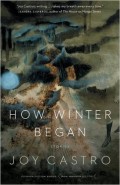
Book Review: How Winter Began: Stories by Joy Castro

How Winter Began
Stories by Joy Castro
University of Nebraska Press, October 2015
ISBN-13: 978-0803276604
$19.95, 198pp.
Reviewed by Natalie Sypolt
When Joy Castro tells a story, readers can be sure of two things: first, they will be blown away by the beauty of the language; second, they will feel. That might sound like a simple thing–just to feel; however, creating a genuine emotion in a reader is one of the most difficult, and most important, skills a writer can master.
The stories in Castro’s collection How Winter Began are not easy; they investigate complex issues of race, class, gender and inequity; they are as painful as they are beautiful. While not explicitly linked, the stories do have similarities and most follow a female narrator as she tells a scene from her life. Castro’s women are like the winter, beautiful and cold; treacherous; fragile. Much like the winter, most of these women are one thing on the surface–lovely to look at, perhaps, or easily fitting into a stereotype that makes everyone else feel comfortable–but under that surface there is an edge of pain that might turn dangerous or even deadly. Take for example Josefa in the historical piece “Independence Day.” A symbol of the Mexican people, forced to surrender their identity when the Americans took over their homeland, Josefa was first raped by one of the miners, then lured him to his death in an act of revenge, both for herself and for her country. This story asks the reader’s heart to break for Josefa and her husband, but then, what are we to feel when she kills the miner? Justified revenge or cold blooded murder? And when she finds her own death, is this the true independence day?
As Josefa reflects, Castro’s women are not ones to be messed with or underestimated. While they do sometimes seem to walk a narrow beam between rational and irrational action (though, irrationality often depends on the circumstances), beneath it all, there is a toughness borne from generations of oppression. In “A Notion I Took”, a young waitress tells of the night she jumped in the dirty water of the San Antonio River on a dare for a few dollars from some of the wealthy out of town customers in her restaurant. What might seem like a fun story is tinged with anger, at the class system that put people like the girl in the dirty water, and the men telling stories “about those crazy big-titty Mexican girls in San Antone: just like a border town, man, anything for a buck.” The girl says, “I knew the plunge was only half of what they wanted: to see a woman do something crazy, maybe get fired even–the power of their money that could work other people about like puppets.” She doesn’t jump for the money though, but for the pull of the water, the solitude and the quiet, to show that she could.
In “A Time of Snow”, we see another woman, also in service to others as a housekeeper. While she knows all the family secrets, she must bite her tongue, even when confronted with the young girl, Julia, who returns from college questioning the justice of her lifestyle in only a way someone of privilege can. “‘Why are you here?’ she cried at me. ‘The little things do matter,’ she said, as though continuing an argument that had started long before I’d entered. ‘Why does Mother make you park in the back?’” Because Julia had the privilege that her wealth and her race afforded her, she could ask these questions. The narrator, though, could only comfort the girl, save her money, and do what she could not to lose her job. Who is the stronger woman? The only who feels outrage at society’s injustices and marches in protest rallies, or the one who must swallow the outrage and who pays her own way to the Eiffel Tower?
While the stories in this collection are sharp and difficult, Castro’s language is often fluid and soft, creating an interesting dissonance between the style and the substance. The writing mirrors the characters–all two ways: feminine and lovely, hard and dangerous. In “Bloody”, for example: “So, all right, fine, whatever, galloping onward toward the blood: in 1991 I stabbed my boyfriend du jour in the left shoulder and he lived, he was fine…The knife went in and out, and the blood was just suddenly there, soaking the shirt, flowing, red, real. Like the knife had opened the door to where a permanent flood was, to what was waiting all along: this red private flow, this shocking interior of my boyfriend…”
To read Joy Castro’s stories is to witness the world as beautiful and horrible, light and dark, and to see people who are both lovely and ugly. Joy Castro will hold your heart. There may be a knife jab or a painful tear.
Natalie Sypolt lives and writes in West Virginia. She received an MFA in fiction from West Virginia University in 2005 and is currently an Assistant Professor at Pierpont Community and Technical College. She also teaches community creative writing classes and workshops. Her work has appeared in Glimmer Train, Switchback, r.kv.r.y., Ardor Literary Magazine, Superstition Review, Paste, Willow Springs Review, and The Kenyon Review Online, among others. Natalie is the winner of the Glimmer Train New Writers Contest and the Betty Gabehart Prize. She is also an active book reviewer whose work has appeared in Los Angeles Review, Fjords Review, Paste, Shenandoah, Harpur Palate, and Mid American Review. Additionally,Natalieserves as a literary editor for the Anthology of Appalachian Writers, is the High School Workshop Coordinator for the West Virginia Writers Workshop at WVU, and is co-host of SummerBooks: A literary podcast.
